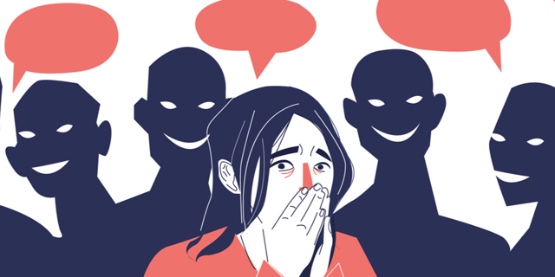
Social anxiety involves the fear of having to engage with other people or entering social situations where they are the center of attention. Most people who experience social anxiety are constantly worried about being watched and judged negatively by people around them. In many cases, a social anxiety disorder or social phobia can significantly limit a person's life and cause a decline in their mental health. Everyone deserves the best quality of life possible, and learning how to manage your social anxiety disorder will allow you to do just that. We've identified some of the best ways to manage your social anxiety disorder and improve your mental health.
Common Symptoms of Social Anxiety
Although experiencing fear and anxiety is a normal part of life, people with anxiety disorders are burdened with intense anxiety about daily social situations. As a result, they may develop an intense social phobia. Common signs and symptoms of social anxiety include feeling uneasy around others and having difficulty controlling their anxiety. Physical symptoms such as increased heart rate, excessive sweating, or weight loss may also be signs of anxiety in patients. Not all social anxiety involves severe social phobia or physical symptoms. For people with less severe social anxiety disorder, other treatment options are available that can help them manage negative thoughts and other harmful behaviors.
What are the Situations That May Cause Social Anxiety?
According to the Liebowitz Social Anxiety Scale, a valid and reliable social anxiety test, some social situations that may cause anxiety in people with social anxiety disorder are:
-Eating or drinking in public places Attending an entertainment
-Speaking in public with or without preparation
-Hosting guests at home
-Testing of knowledge, skill or ability
-Returning a purchased item for a refund
-Resisting pushy salespeople
-Making eye contact with someone you don't know very well
-Expressing disagreement with someone you don't know very well
-Talking on the phone with someone you don't know very well
-Trying to meet someone
-Using public toilets
Different Types of Anxiety Disorders
There are several main types of anxiety disorders, including:
Generalized Anxiety Disorder – Characterized by intense feelings of worry or fear despite little or no reason to experience them.
Social Anxiety or Social Phobia — People with social phobia are highly self-conscious about participating in everyday social situations for fear of being judged.
Specific Phobias – An intense fear of a specific object or situation (for example, having to eat in front of others).
Panic Disorder – People with panic disorder experience intense fears that lead to panic attacks.
Does Social Anxiety Affect Your Daily Life?
A great way to start when trying to manage social anxiety is to become less self-aware. One of the major emotions experienced by people dealing with social anxiety disorder is a false awareness of being observed. It is important for people with social anxiety to focus less on what they think is wrong with themselves and more on other people and their environment. If you can, you can choose a specific person to focus on to distract yourself from your negative thoughts. It's also important to remember that the physical and mental effects of your social anxiety disorder are not visible in most cases. It's important to let go of any pressure that might make you feel like you're perfect and stay in the moment. Breath control is a great way to manage social anxiety and improve your mental health. One of the most common symptoms of social anxiety is difficulty breathing. Hyperventilation is often the body's response to feelings of fear and panic. It is very important to slow your breathing to regulate yourself. When you're feeling overwhelmed, the first thing to do is find a comfortable place to sit. Once you find a place to sit, begin breathing slowly and deeply for about four seconds. Hold your breath for two seconds, exhale slowly, and repeat until you feel better.
Psychotherapy
Psychotherapy is a popular treatment option for people struggling with anxiety disorders and intense fears of social situations. People dealing with social anxiety disorder are advised to undergo psychotherapy. In many cases, psychotherapy can teach people how to deal with their anxiety in a positive way. Cognitive-behavioral therapy (CBT) is most often used to treat social anxiety disorder in this situation. Cognitive-behavioral therapy focuses on improving physical regulation as well as challenging negative thought patterns and behaviors. In most cases where cognitive behavioral therapy is applied, exposure therapy is preferred to treat social anxiety. Exposure therapy involves a therapist gradually exposing their patient to situations that trigger their social anxiety and help them develop and implement ways to overcome their fears. Most cognitive-behavioral therapy treatments last up to 12 weeks and may require one or more interactions per week. Cognitive-behavioral therapy ensures that patients have a trusted, trained person to help them get rid of their fears. A psychotherapist is available to monitor the process from a perspective that allows the therapist to determine what might guide the individual through an anxious situation and help identify underlying causes of anxiety.
Are you wondering what level of social anxiety you have? You can find the answer to this question by taking our social anxiety test!
